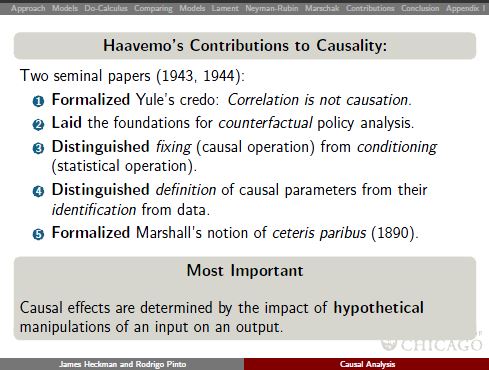Those are the words of James Heckman, from a lecture (slides, paper) at the University of Oslo last week. In particular, it is Trygve Haavelmo’s 1943 paper The statistical implications of a system of simultaneous equations (pdf) that gets the honor of being “the first rigorous treatment of causality”. A summary:
According to Heckman, Haavelmo built on Marshall’s general idea of ceteris paribus to define fixing (“an abstract operation that assigns independent variation to the variable being fixed (p. 8)”), that is to be distinguished from classical statistical conditioning (“a statistical operation that accounts for the dependence structure in the data (p. 8)”). This fixing occur hypothetically, thus causality becomes defined in terms of thought experiments, along the earlier thoughts of Ragnar Frisch. In Heckman’s words: “Causal effects are not empirical statements or descriptions of actual worlds, but descriptions of hypothetical worlds obtained by varying – hypothetically – the inputs determining outcomes. (pp. 2-3)”.
Much of the lecture and paper is a polemic against Pearl’s do-calculus. Those interested in that debate can read Heckman and Pinto’s paper and Pearl’s comments on it, watch a conference discussion they had last year, or read stuff that more able people than me have blogged about before. Not debatable, though, is that Heckman knows to please his hosts.
